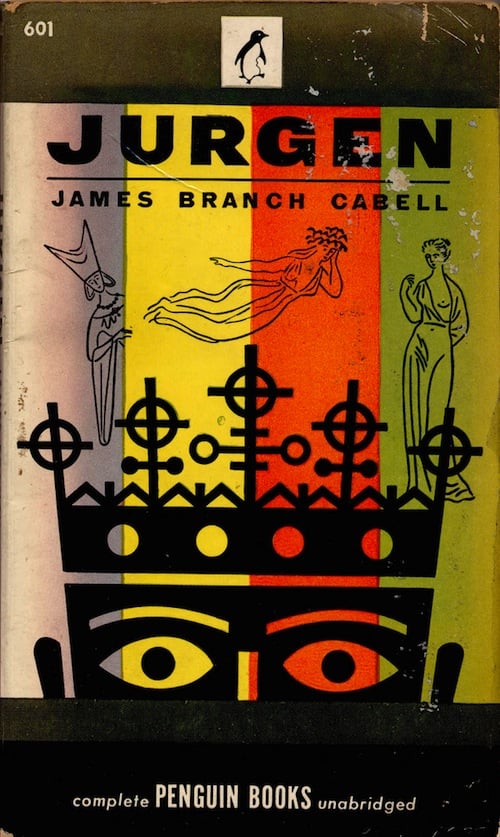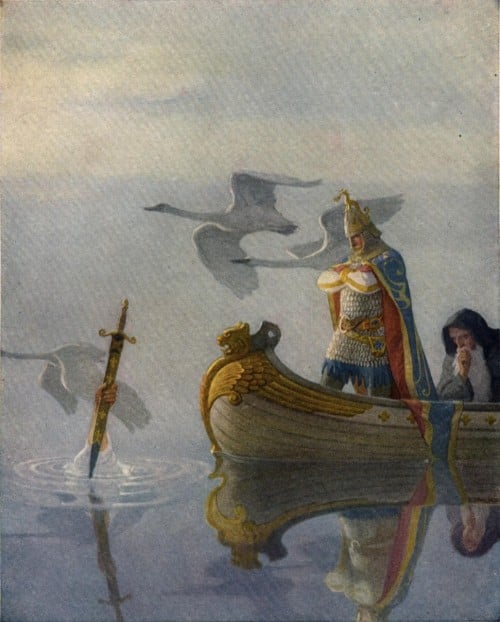Jurgen (14)
By:
June 16, 2015

James Branch Cabell’s 1919 ironic fantasy novel Jurgen, A Comedy of Justice, the protagonist of which seduces women everywhere he travels — including into Arthurian legend and Hell itself — is (according to Aleister Crowley) one of the “epoch-making masterpieces of philosophy.” Cabell’s sardonic inversion of romantic fantasy was postmodernist avant la lettre. HiLoBooks is pleased to serialize Jurgen here at HILOBROW. Enjoy!
At Cameliard the young Duke of Logreus spent most of his time in the company of Guenevere, whose father made no objection overtly. Gogyrvan had his promised talk with Jurgen.
“I lament that Dame Yolande dealt over-thriftily with you,” the King said, first of all: “for I estimated you two would be as spark and tinder, kindling between you an amorous conflagration to burn up all this nonsense about my daughter.”
“Thrift, sir,” said Jurgen, discreetly, “is a proverbial virtue, and fires may not consume true love.”
“That is the truth,” Gogyrvan admitted, “whoever says it.” And he sighed.
Then for a while he sat in nodding meditation. Tonight the old King wore a disreputably rusty gown of black stuff, with fur about the neck and sleeves of it, and his scant white hair was covered by a very shabby black cap. So he huddled over a small fire in a large stone fireplace carved with shields; beside him was white wine and red, which stayed untasted while Gogyrvan meditated upon things that fretted him.

“Now, then!” says Gogyrvan Gawr: “this marriage with the high King of the Britons must go forward, of course. That was settled last year, when Arthur and his devil-mongers, the Lady of the Lake and Merlin Ambrosius, were at some pains to rescue me at Carohaise. I estimate that Arthur’s ambassadors, probably the devil-mongers themselves, will come for my daughter before June is out. Meanwhile, you two have youth and love for playthings, and it is spring.”
“What is the season of the year to me,” groaned Jurgen, “when I reflect that within a week or so the lady of my heart will be borne away from me forever? How can I be happy, when all the while I know the long years of misery and vain regret are near at hand?”
“You are saying that,” observed the King, “in part because you drank too much last night, and in part because you think it is expected of you. For in point of fact, you are as happy as anyone is permitted to be in this world, through the simple reason that you are young. Misery, as you employ the word, I consider to be a poetical trophe: but I can assure you that the moment you are no longer young the years of vain regret will begin, either way.”
“That is true,” said Jurgen, heartily.
“How do you know? Now then, put it I were insane enough to marry my daughter to a mere duke, you would grow damnably tired of her: I can assure you of that also, for in disposition Guenevere is her sainted mother all over again. She is nice looking, of course, because in that she takes after my side of the family: but, between ourselves, she is not particularly intelligent, and she will always be making eyes at some man or another. To-day it appears to be your turn to serve as her target, in a fine glittering shirt of which the like was never seen in Glathion. I deplore, but even so I cannot deny, your rights as the champion who rescued her: and I must bid you make the most of that turn.”
“Meanwhile, it occurs to me, sir, that it is unusual to betroth your daughter to one man, and permit her to go freely with another.”
“If you insist upon it,” said Gogyrvan Gawr, “I can of course lock up the pair of you, in separate dungeons, until the wedding day. Meanwhile, it occurs to me you should be the last commentator to grumble.”
“Why, I tell you plainly, sir, that critical persons would say you are taking very small care of your daughter’s honor.”
“To that there are several answers,” replied the King. “One is that I remember my late wife as tenderly as possible, and I reflect I have only her word for it as to Guenevere’s being my daughter. Another is that, though my daughter is a quiet and well-conducted young woman, I never heard King Thragnar was anything of this sort.”
“Oh, sir,” said Jurgen, horrified, “whatever are you hinting!”
“All sorts of things, however, happen in caves, things which it is wiser to ignore in sunlight. So I ignore: I ask no questions: my business is to marry my daughter acceptably, and that only. Such discoveries as may be made by her husband afterward are his affair, not mine. This much I might tell you, Messire de Logreus, by way of answer. But the real answer is to bid you consider this: that a woman’s honor is concerned with one thing only, and it is a thing with which the honor of a man is not concerned at all.”
“But now you talk in riddles, King, and I wonder what it is you would have me do.”
Gogyrvan grinned. “Obviously, I advise you to give thanks you were born a man, because that sturdier sex has so much less need to bother over breakage.”
“What sort of breakage, sir?” says Jurgen.
Gogyrvan told him.
Duke Jurgen for the second time looked properly horrified. “Your aphorisms, King, are abominable, and of a sort unlikely to quiet my misery. However, we were speaking of your daughter, and it is she who must be considered rather than I.”
“Now I perceive that you take my meaning perfectly. Yes, in all matters which concern my daughter I would have you lie like a gentleman.”
“Well, I am afraid, sir,” said Jurgen, after a pause, “that you are a person of somewhat degraded ideals.”
“Ah, but you are young. Youth can afford ideals, being vigorous enough to stand the hard knocks they earn their possessor. But I am an old fellow cursed with a tender heart and tolerably keen eyes. That combination, Messire de Logreus, is one which very often forces me to jeer out of season, simply because I know myself to be upon the verge of far more untimely tears.”
Thus Gogyrvan replied. He was silent for a while, and he contemplated the fire. Then he waved a shriveled hand toward the window, and Gogyrvan began to speak, meditatively:
“Messire de Logreus, it is night in my city of Cameliard. And somewhere one of those roofs harbors a girl whom we will call Lynette. She has a lover — we will say he is called Sagramor. The names do not matter. Tonight, as I speak with you, Lynette lies motionless in the carved wide bed that formerly was her mother’s. She is thinking of Sagramor. The room is dark save where moonlight silvers the diamond-shaped panes of ancient windows. In every corner of the room mysterious quivering suggestions lurk.”
“Ah, sire,” says Jurgen, “you also are a poet!”

“Do not interrupt me, then! Lynette, I repeat, is thinking of Sagramor. Again they sit near the lake, under an apple-tree older than Rome. The knotted branches of the tree are upraised as in benediction: and petals — petals, fluttering, drifting, turning, — interminable white petals fall silently in the stillness. Neither speaks: for there is no need. Silently he brushes a petal from the blackness of her hair, and silently he kisses her. The lake is dusky and hard-seeming as jade. Two lonely stars hang low in the green sky. It is droll that the chest of a man is hairy, oh, very droll! And a bird is singing, a silvery needle of sound moves fitfully in the stillness. Surely high Heaven is thus quietly colored and thus strangely lovely. So at least thinks little Lynette, lying motionless like a little mouse, in the carved wide bed wherein Lynette was born.”
“A very moving touch, that,” Jurgen interpolated.
“Now, there is another sort of singing: for now the pot-house closes, big shutters bang, feet shuffle, a drunken man hiccoughs in his singing. It is a love-song he is murdering. He sheds inexplicable tears as he lurches nearer and nearer to Lynette’s window, and his heart is all magnanimity, for Sagramor is celebrating his latest conquest. Do you not think that this or something very like this is happening to-night in my city of Cameliard, Messire de Logreus?”.
“It happens momently,” said Jurgen, “everywhere. For thus is every woman for a little while, and thus is every man for all time.”
“That being a dreadful truth,” continued Gogyrvan, “you may take it as one of the many reasons why I jeer out of season in order to stave off far more untimely tears. For this thing happens: in my city it happens, and in my castle it happens. King or no, I am powerless to prevent its happening. So I can but shrug and hearten my old blood with a fresh bottle. No less, I regard the young woman, who is quite possibly my daughter, with considerable affection: and it would be salutary for you to remember that circumstance, Messire de Logreus, if ever you are tempted to be candid.”
Jurgen was horrified. “But with the Princess, sir, it is unthinkable that I should not deal fairly.”
King Gogyrvan continued to look at Jurgen. Gogyrvan Gawr said nothing, and not a muscle of him moved.
“Although of course,” said Jurgen, “I would, in simple justice to her, not ever consider volunteering any information likely to cause pain.”
“Again I perceive,” said Gogyrvan, “that you understand me. Yet I did not speak of my daughter only, but of everybody.”
“How then, sir, would you have me deal with everybody?”
“Why, I can but repeat my words,” says Gogyrvan, very patiently: “I would have you lie like a gentleman. And now be off with you, for I am going to sleep. I shall not be wide awake again until my daughter is safely married. And that is absolutely all I can do for you.”
“Do you think this is reputable conduct, King?”
“Oh, no!” says Gogyrvan, surprised. “It is what we call philanthropy.”
Footnotes from Notes on Jurgen (1928), by James P. Cover — with additional comments from the creators of this website; rewritten, in some instances, by HiLoBooks.
* The Lady of the Lake — The Lady of the Lake was a beneficent sorceress in Arthurian legends. The daughter of the godson of the goddess Diana, she dwelt in fairyland, which was concealed by a mirage of water. It was she who gave Arthur his magic sword, Excalibur, and who was present at his death and burial. It was she, also, who stole Lancelot away from his mother and brought him up at the bottom of her lake; and who learned Merlin’s secret and shut him up forever in a magic tower.
* Carohaise — Modern Carahès or Carhaix in Brittany.
RADIUM AGE SCIENCE FICTION: “Radium Age” is HILOBROW’s name for the 1904–33 era, which saw the discovery of radioactivity, the revelation that matter itself is constantly in movement — a fitting metaphor for the first decades of the 20th century, during which old scientific, religious, political, and social certainties were shattered. This era also saw the publication of genre-shattering writing by Edgar Rice Burroughs, Sax Rohmer, E.E. “Doc” Smith, Jack London, Arthur Conan Doyle, Aldous Huxley, Olaf Stapledon, Karel Čapek, H.P. Lovecraft, Charlotte Perkins Gilman, Yevgeny Zamyatin, Philip Gordon Wylie, and other pioneers of post-Verne/Wells, pre-Golden Age “science fiction.” More info here.
READ GORGEOUS PAPERBACKS: HiLoBooks has reissued the following 10 obscure but amazing Radium Age science fiction novels in beautiful print editions: Jack London’s The Scarlet Plague, Rudyard Kipling’s With the Night Mail (and “As Easy as A.B.C.”), Arthur Conan Doyle’s The Poison Belt, H. Rider Haggard’s When the World Shook, Edward Shanks’ The People of the Ruins, William Hope Hodgson’s The Night Land, J.D. Beresford’s Goslings, E.V. Odle’s The Clockwork Man, Cicely Hamilton’s Theodore Savage, and Muriel Jaeger’s The Man with Six Senses. For more information, visit the HiLoBooks homepage.
SERIALIZED BY HILOBOOKS: Jack London’s The Scarlet Plague | Rudyard Kipling’s With the Night Mail (and “As Easy as A.B.C.”) | Arthur Conan Doyle’s The Poison Belt | H. Rider Haggard’s When the World Shook | Edward Shanks’ The People of the Ruins | William Hope Hodgson’s The Night Land | J.D. Beresford’s Goslings | E.V. Odle’s The Clockwork Man | Cicely Hamilton’s Theodore Savage | Muriel Jaeger’s The Man With Six Senses | Jack London’s “The Red One” | Philip Francis Nowlan’s Armageddon 2419 A.D. | Homer Eon Flint’s The Devolutionist | W.E.B. DuBois’s “The Comet” | Edgar Rice Burroughs’s The Moon Men | Charlotte Perkins Gilman’s Herland | Sax Rohmer’s “The Zayat Kiss” | Eimar O’Duffy’s King Goshawk and the Birds | Frances Hodgson Burnett’s The Lost Prince | Morley Roberts’s The Fugitives | Helen MacInnes’s The Unconquerable | Geoffrey Household’s Watcher in the Shadows | William Haggard’s The High Wire | Hammond Innes’s Air Bridge | James Branch Cabell’s Jurgen | John Buchan’s “No Man’s Land” | John Russell’s “The Fourth Man” | E.M. Forster’s “The Machine Stops” | John Buchan’s Huntingtower | Arthur Conan Doyle’s When the World Screamed | Victor Bridges’ A Rogue By Compulsion | Jack London’s The Iron Heel | H. De Vere Stacpoole’s The Man Who Lost Himself | P.G. Wodehouse’s Leave It to Psmith | Richard Connell’s “The Most Dangerous Game” | Houdini and Lovecraft’s “Imprisoned with the Pharaohs” | Arthur Conan Doyle’s “The Sussex Vampire.”
ORIGINAL FICTION: HILOBROW has serialized three novels: James Parker’s The Ballad of Cocky The Fox (“a proof-of-concept that serialization can work on the Internet” — The Atlantic); Karinne Keithley Syers’s Linda Linda Linda (which includes original music); and Robert Waldron’s roman à clef The School on the Fens. We also publish original stories and comics. These include: Matthew Battles’s stories “Gita Nova“, “Makes the Man,” “Imago,” “Camera Lucida,” “A Simple Message”, “Children of the Volcano”, “The Gnomon”, “Billable Memories”, “For Provisional Description of Superficial Features”, “The Dogs in the Trees”, “The Sovereignties of Invention”, and “Survivor: The Island of Dr. Moreau”; several of these later appeared in the collection The Sovereignties of Invention | Peggy Nelson’s “Mood Indigo“, “Top Kill Fail“, and “Mercerism” | Annalee Newitz’s “The Great Oxygen Race” | Flourish Klink’s Star Trek fanfic “Conference Comms” | Charlie Mitchell’s “A Fantasy Land” | Charlie Mitchell’s “Sentinels” | Joshua Glenn’s “The Lawless One”, and the mashup story “Zarathustra vs. Swamp Thing” | Adam McGovern and Paolo Leandri’s Idoru Jones comics | John Holbo’s “Sugarplum Squeampunk” | “Another Corporate Death” (1) and “Another Corporate Death” (2) by Mike Fleisch | Kathryn Kuitenbrouwer and Frank Fiorentino’s graphic novel “The Song of Otto” (excerpt) | John Holbo’s graphic novel On Beyond Zarathustra (excerpt) | “Manoj” and “Josh” by Vijay Balakrishnan | “Verge” by Chris Rossi, and his audio novel Low Priority Hero | EPIC WINS: THE ILIAD (1.408-415) by Flourish Klink | EPIC WINS: THE KALEVALA (3.1-278) by James Parker | EPIC WINS: THE ARGONAUTICA (2.815-834) by Joshua Glenn | EPIC WINS: THE MYTH OF THE ELK by Matthew Battles | TROUBLED SUPERHUMAN CONTEST: Charles Pappas, “The Law” | CATASTROPHE CONTEST: Timothy Raymond, “Hem and the Flood” | TELEPATHY CONTEST: Rachel Ellis Adams, “Fatima, Can You Hear Me?” | OIL SPILL CONTEST: A.E. Smith, “Sound Thinking | LITTLE NEMO CAPTION CONTEST: Joe Lyons, “Necronomicon” | SPOOKY-KOOKY CONTEST: Tucker Cummings, “Well Marbled” | INVENT-A-HERO CONTEST: TG Gibbon, “The Firefly” | FANFICTION CONTEST: Lyette Mercier’s “Sex and the Single Superhero”
